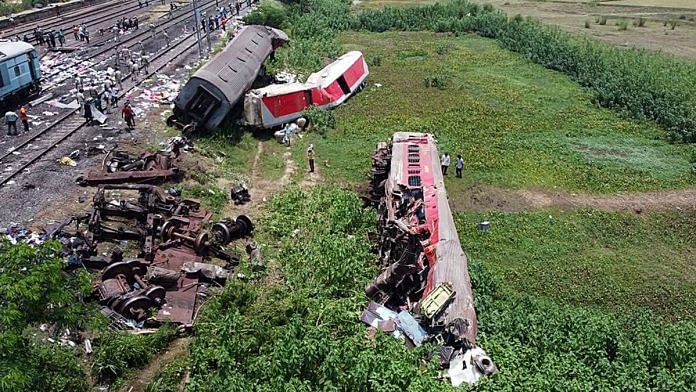The heartrending scenes at the Odisha rail accident have shaken the people’s confidence in the safety of the Indian Railways. This was made worse by the fact that safety is touted as the ministry’s first priority. World leaders have also offered their condolences. But conspiracy theories and the CBI enquiry shouldn’t distract the nation from the main issues.
This is the largest rail accident since 1995 when two passenger trains collided in Firozabad resulting in a death toll of 358. Immediate site studies revealed that the Coromandel Express, running at a speed of 128 kmph on up main line was signalled to enter the loop line where a loaded goods train stood stabled, resulting in a big crash. Due to the impact a few of its coaches toppled onto the downward main line, where the Howrah Express was moving towards. It entered the station within a couple of minutes and hit the capsised coaches resulting in the huge disaster.
The station has fail-safe panel interlocking duly supported by electric point machines for the setting of routes; data loggers; relays integrated with signals — all working towards ensuring that the appropriate route is set, is clear and the right signals have been given.
Though rare, there is a chance of mismatches i.e. the point not setting properly or a relay not picking up and thus signals not operating. In such a case, the station master alerts the electrical signal maintainer and hands over the key to the relay room enabling the maintainer to adjust the relays and circuits. However, due to the high volume of trains waiting to proceed, it is not always possible to temporarily stop the traffic for maintenance. This is patently unsafe and results in situations like what happened — a mismatch between the route and the signals.
Also Read: Rail privatisation shouldn’t be an afterthought post-Odisha collision. See Japan, UK
Huge pressure on officers
The presence of Kavach—the anti-collision system — wouldn’t have made a difference. And it is wrong to say that the staff come to work with a mischievous mind and are deliberately sabotaging operations. They are under huge pressure. Goals of punctuality and the demands of an increasing number of trains result in unsafe working conditions. Despite having the best systems in place, this is a huge challenge.
Increasing the throughput, ensuring safety through maintenance, preventive checks, and upgradation is a 24/7 task for every Railways employee.
The possibility of such accidents happening is very low with modern interlocking. Indian Railways runs 13,523 passenger trains and 9,146 freight trains with each train on average passing 70 stations in 24 hours, the total number of times trains pass by each other in a day adds up to 8,40,000. Statistically, it’s only one such crossing met with an accident but no disaster can be tolerated.
An inquiry under the Commissioner of Railway Safety is a statutory requirement. Section 6(c) of the Railways Act outlines this. An inquiry under the Commission of Enquiry Act can supersede the aforesaid as per Section 119 of the Railway Act. A CBI inquiry can only examine criminality.
The investigation by a commission is going to be done on the following aspects — wrong wiring of the various circuits; cable matching indoors and outdoors; validation of the data logger; proper disconnection and reconnection after restoration and working of assets. Whether a traffic block was demanded or not is also a key point. And if demanded, the reasons why it was not given and why work was done without it must also be probed.
Another pertinent point of investigation is whether the split in the point caused the train to take two routes, no routes or caused the derailment. The role of the two departments, track and signalling, is crucial.
Indian Railways may consider adopting the European Rail Traffic Management System or equivalent which integrates Kavach too as a possible solution. The Railways should also add on cab signalling, particularly in Northern India which is affected by fog in winter months though it should gradually be extended all over the country.
Better maintenance procedures in the field of track signalling, Railway Overhead Equipment and rolling stock shall remain the backbone of railway operations. Outsourcing safety maintenance will be the wrong solution. This tragedy should bring about fresh thinking on the issue of whether the railways should be run by the Indian Railway Management Service or technical experts. Without knowledge and sincerity, no method can bring about safety.
The author is a former engineer, Railway Board. Views are personal.
(Edited by Theres Sudeep)



